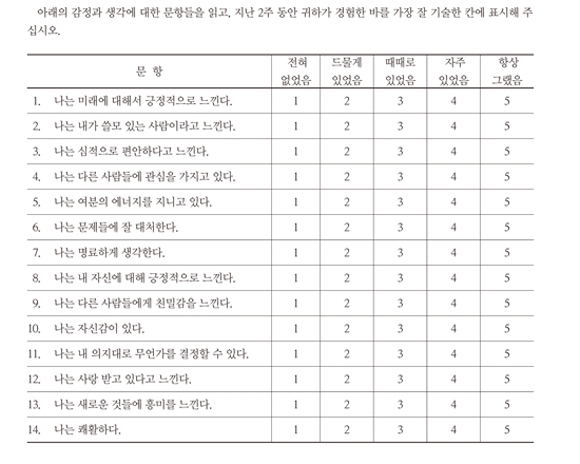Abstract
Objectives
The aim of this study was to develop the Korean version of the Warwick-Edinburgh Mental Well-being Scale (K-WEMWBS) and to examine its factorial structure, reliability, and convergent/discriminant validity.
Methods
In this study, the Warwick-Edinburgh Mental Well-being Scale (WEMWBS), a self-rating measure for assessment of mental well-being, was translated into Korean. It was completed by 222 respondents, including 117 healthy subjects and 105 psychiatric patients from both inpatient and outpatient clinics at Soonchunhyang University Hospitals in Bucheon, Cheonan, and Seoul.
Results
The K-WEMWBS showed good content validity. Confirmatory factor analysis supported a single factor structure. The Cronbach's alpha value for the K-WEMWBS was 0.944, which demonstrated good internal consistency. Test-retest reliability at 2-8 weeks was high (0.789). The K-WEMWBS showed high correlations with mental health, positive affect, and quality of life scales. Moderate negative correlation was observed between the K-WEMWBS and the negative affect scale. Discriminant validity was partially identified. Statistically significant differences in scores were observed between the psychiatric patient group and the control group.
Figures and Tables
Table 4
Correlations between K-WEMWBS and other scales

*: p<0.05, †: p<0.01. MHC-SF : Mental Health Continuum-Short Form, K-WEMWBS : Korean version of Warwick Edinburgh Mental Well-being Scale, PANAS-NA : Positive and Negative Affect Schedule-Negative Affect, PANAS-PA : Positive and Negative Affect Schedule-Positive Affect, WHOQOL-BREF : WHO Quality of Life Scale Abbreviated Version
Acknowledgments
The authors gratefully acknowledge the consent by Stewart-Brown and Frances Taggart in translating WEMWBS into Korean and using the Korean version of WEMWBS.
This study was supported by Soonchunhyang University grant funded by the Research Institute for Healthcare Policy, Korean Medical Association (KMA).
References
1. Cho SH, Woo JM, Kim W, Byun KR, Kang EH, Choi SW, et al. The Development of the 'Mental Fitness' Scale. J Korean Neuropsychiatr Assoc. 2011; 50:116–124.
2. World Health Organization. The World Health Report 2001: Mental Health. New Understanding, New Hope. Geneva: World Health Organization;2001.
3. Vaingankar JA, Subramaniam M, Lim YW, Sherbourne C, Luo N, Ryan G, et al. From well-being to positive mental health: conceptualization and qualitative development of an instrument in Singapore. Qual Life Res. 2012; 21:1785–1794.

4. Costanza R, Fisher B, Ali S, Beer C, Bond L, Boumans R, et al. Quality of life: an approach integrating opportunities, human needs, and subjective well-being. Ecol Econ. 2007; 61:267–276.

5. Gasper D. Understanding the diversity of conceptions of well-being and quality of life. J Socio Econ. 2010; 39:351–360.

7. Tennant R, Hiller L, Fishwick R, Platt S, Joseph S, Weich S, et al. The Warwick-Edinburgh Mental Well-being Scale (WEMWBS): development and UK validation. Health Qual Life Outcomes. 2007; 5:63.

8. Stewart-Brown S, Janmohamed K, Parkinson J. Warwick-Edinburgh Mental Well-being Scale (WEMWBS) User Guide Version 1. Coventry, UK: Warwick Medical School, University of Warwick;2008.
9. Keyes CL, Wissing M, Potgieter JP, Temane M, Kruger A, van Rooy S. Evaluation of the mental health continuum-short form (MHC-SF) in setswana-speaking South Africans. Clin Psychol Psychother. 2008; 15:181–192.

10. Vaingankar JA, Subramaniam M, Chong SA, Abdin E, Edelen MO, Picco L, et al. The positive mental health instrument: development and validation of a culturally relevant scale in a multi-ethnic asian population. Health Qual Life Outcomes. 2011; 9:92.

11. Kuyken W, Orley J, Hudelson P, Sartorius N. Quality of life assessment across cultures. Int J Ment Health. 1994; 23:5–27.

12. Lim YJ, Ko YG, Shin HC, Cho YR. Psychometric evaluation of the Mental Health Continuum-Short Form (MHC-SF) in South Koreans. Korean J Psychol Gen. 2012; 31:369–386.
14. Min SK, Lee CI, Kim KI, Suh SY, Kim DK. Development of Korean Version of WHO Quality of Life Scale Abbreviated Version (WHOQOL-BREF). J Korean Neuropsychiatr Assoc. 2000; 39:571–579.
15. Lee HH, Kim EJ, Lee MG. Brief report: a validation study of Korea positive and negative affect schedule: the PANAS scales. Korean J Clin Psychol. 2003; 22:935–946.
16. Lim YJ, Yu BH, Kim DK, Kim JH. The positive and negative affect schedule: psychometric properties of the Korean Version. Psychiatry Investig. 2010; 7:163–169.

17. Min SK, Kim KI, Park IH. Korean version of WHOQOL. Seoul: Hana Medical Publishing company;2002.
18. Bentler P. EQS for Windows User's Guide. Encino, CA: Multivariate Software Inc;1995.
19. Kim KS. AMOS 18.0 structural equation modeling. Seoul: Hannarae Publishing company;2010.
20. Kwon SM. Positive Psychology. Seoul: Hakjisa;2008.
21. Bradburn NM. The Structure of Psychological Well-Being. Chicago: Aldine;1969.




 PDF
PDF ePub
ePub Citation
Citation Print
Print







 XML Download
XML Download